I started The Dark Tower series at the beginning of this year by rereading The Gunslinger. I read it a few years ago but hadn’t had the will to tackle the whole thing at that stage. So I dutifully reread The Gunslinger this year and then kept on. Anyone who has read the series will know the importance of the number 19 to the story. It is ubiquitous and reoccurring. It assumes mystical import. It was kind of satisfying to realise that I finished the book this morning on the nineteenth of the month. It felt right, as though my reading conformed to the idea of Ka that runs throughout the series; that I had found my own 19 just as the characters are constantly reminded of its significance in their own reality.
This last volume finds Roland’s ka-tet battling agents of the Crimson King on several fronts. Callahan and Jake must first try to stop the birth of Mia’s son, and in doing so, they face a group of first order vampires. Roland must try to stop the Breakers achieving the destruction of the Beams that support the Dark Tower. The Rose in New York must be protected by the Tet Corporation and Stephen King must be saved from death if their reality, and the universe, is to survive. And then there is the Dark Tower itself, an ever-present shadow in their minds, beckoning Roland on irresistibly like the Grail, itself.
My response to this series, so far, has been varied. I think there are weaker and stronger books in it, although I think all the books suffer somewhat from overwriting and, sometimes, poor structure. Stephen King is a good popular writer, but he is not an excellent writer. With this said, it is impossible to avoid the subject of King as a writer or person when it comes to reading The Dark Tower. In my review for Wolves of Calla I was becoming intrigued at the way King was inserting himself into the narrative. I talked about intertextuality in that review, although much of that discussion was about King’s presence in the text, and my not wanting to give too much away. However, I don’t think I can review this book without talking about some aspects of the plot and its author. The famous accident that almost killed King in real life motivated him to finish the series and shaped his fantasy. As a result, King placed himself firmly at the centre of the narrative in the last three volumes, even if he is not always “onstage”. Judging from everything he writes about his method in the introduction, in the story and elsewhere, it’s pretty clear that the story he tells about his fictional alter ego in the novels isn’t that fictional: that he had an outline for the series but lost it, as his fictional self tells Roland, is something he claims happened in reality; that he had little idea where the story was going by the end of the fourth volume, so he couldn’t tell fans who were close to death how the story would pan out, is a point also made in the narrative. That King didn’t know where the story was going suggests why he introduces important plot elements in the Arguments before some of the novels, or seems to pretend to the reader in the opening of his narratives that some plot points are already known; the Crimson King, Gan or the Breakers, for instance.
In his Author Note at the end of this novel, King defends his decision to insert himself into the narrative. I don’t think that artistic choice needs defending, although it is interesting to hear what he says prompted him to do it. King felt many of his books linked or referred to Roland’s world, and that writing this series was a way of unifying as many of my previous stories as possible beneath the arch of the über-tale.
He reasons since I was the one who wrote them, it seemed logical that I was part of the gunslinger’s ka.
I was interested in this intention and tried to keep track of any mentions he makes of his other novels as I read. My count includes: Carrie; Insomnia; Hearts in Atlantis; ‘salem’s Lot; Wizard and Glass; Desperation and Misery. Also, there are many allusions to the assassination of John F. Kennedy, which would later become the subject of his book 11/22/63. I’m sure I’ve missed some, and the list is only for this volume.
King’s first appearance in Wolves of Calla is the turning point in the series. I got the sense that with the accident King saw a way to move forward with the story, having been stuck for a number of years. Turning himself into a character who not only had some link with the quest, but who became a part of the quest itself – saving King from the minivan who struck him in real life becomes part of the quest to save the Dark Tower – was an interesting departure from standard fantasy.
I believe that if King introduced himself into the narrative because he felt the books to exist within an already developed fictional universe, then it is reasonable to consider his role within the story. But the bridge he creates between his fantasy world, the world of his other fiction, and therefore, also, his place in the real world as a famous writer, is problematic for him. King, despite his dismissive comment about metafiction, seems defensive about not only his artistic decision, but uses his fiction to reject critical response. As a result, I was not always comfortable with King’s use of his own persona in the story. This was particularly true when I felt the narrative began to serve King’s existence exterior to the novel as a famous writer beyond the needs of the narrative. He speaks in the introduction about the kind of writer he is; not a ‘serious’ literary writer who looks inward, but a writer of popular novels who is more considerate of his audience. His book On Writing also suggests this sense of self. There is an edge of anti-intellectualism about King, at least when it comes to evaluation of his work, and he sometimes uses the narrative to address this:
. . . a genuinely talented writer who’d turned himself into a shoddy (but rich) quick-sketch artist. (139)
I guess if others won’t say it, you have to say it yourself. Especially to your fans. Or this exchange between fictional King and another character:
“How does it happen that a writer who’s not even very good – and I can say that, I’ve read four or five of his books – gets to be in charge of the world’s destiny? Or the entire universe?”
“If he’s not very good, why didn’t you stop at one?”
“Mrs Tassenbaum smiled. “Touche! He is readable, I’ll give him that – tells a good story, but has a tin ear for language.” (424)
Also, I can’t resist this one:
Stephen King is their poet laureate (590)
King’s narrative places himself at the centre of his fictional universe. The most important writer ever! In his introduction, he states that when considering the prospect that he might die before finishing the series after the minivan accident, that he had no urge to be filed away with The Canterbury Tales and The Mystery of Edwin Drood
. Perhaps it takes a man with an ego large enough to compare himself to Chaucer and Dickens to write a series like this. Or I might balance this criticism with reference to Chaucer, who also used a fictional version of himself in The Canterbury Tales. Fictional Chaucer, like other pilgrims travelling to Canterbury, is called upon to tell a tale. He tells the tale of Sir Thopas, but he tells it so badly that the host interrupts him and asks him to stop. It’s a reminder, despite everything, that fictional King is still a creation of his author.
But as a writer existing in the real world, who has achieved fame and fortune, there still seems a defensiveness in the way King manipulates these metatextual elements. For instance, besides his own books, which he shamelessly promotes in the story, the book is full of allusions to other texts. Like someone keen to show some learning, King references novels, authors, films, poets, famous people and incidents, songs, short stories and plays that seem tangential to the narrative flow. I had a feeling as I read that King not only feels a need to reveal his literary ancestry, but a need to remind us he is well read, not just a popular hack. When reading The Dark Tower, I was intrigued at how much the narrative seemed to reveal about its author.
Even when he is not ‘onstage’ it is hard not to focus on King as writer, since he finds ways of putting himself front and centre. He has his surrogates, like Feemalo, Fumalo and Fimalo, the three shape changers that Roland and Susannah meet on their way to the Dark Tower. All appear as Stephen King, like Tweedledum and Tweedle-dee on steroids. Each represents one aspect of a psychological whole: the id, ego and superego. Susannah asks Are you Stephen King’s ego, id and superego?
Naturally, this is where we can make the mistake of simply equating King’s character with his real self. Even he is at pains to point out the differences between him and his literary doppelganger.
However, he does equate Roland’s quest with his own literary quest in his Author’s Note. Roland’s own physical resemblance to King is sometimes remarked upon in the novel. And King’s, own self-admitted struggle with substance abuse, such as alcohol in real life, is reflected in almost all characters in the book, all beset by some kind of addiction. Roland is addicted to the lure of the Dark Tower, for instance, and Eddie is a recovered drug addict. Yet even when it comes to minor characters, King takes care to point out their own form of addiction, like the group of Breakers who appear to be addicted to the work of breaking the beams of the Tower, even though it will destroy their very existence. It seems all characters in The Dark Tower are addicts of some kind.
King not only draws attention to himself, but foregrounds his writing, as well. There is a question in most job interviews that goes something like this: What is your greatest weakness?
Of course, the strategy is to somehow turn that weakness into a positive. One of the weaknesses I have addressed in former reviews about King is his tendency to find easy solutions to narrative problems. Done too blithely, it can make a reader feel cheated. King draws attention to this aspect of his writing, too. At times I felt this worked very well and was intriguing. At others, I felt the conceit was a little clumsy, revealing the wheels and machinations of the story whirring beneath the surface of the plot; more a distraction, like watching the author twist and writhe in the effort to bring his cumbersome plot under control.
This is evident with the schrimshaw turtle which King introduces into the narrative. It gives the characters the power to put their enemies under a spell that neutralises them. Perhaps thinking this was too easy a device, King writes:
The basic concept was that if a playwright got himself into a corner he could send down the god, who arrived in a flower-decked bucka wagon from overhead and rescued the characters who were in trouble … Eddie thought that popular novelists – of the sort sai King seemed on his way to becoming – probably still used the technique, only disguising it better. Little escape hatches … like a key. Not to mention the scrimshaw turtle. (115)
Perhaps by highlighting the machinery of the plot, King felt criticism of his conceit to introduce himself as a controlling agent in his world would be neutralised. Just supposing. I kept wondering about King. About his choice to become a character; a character who remains a famous writer in the story, and therefore not only aware of his audience, but his critics. My impression is that King in real life encourages his fans’ adulation but disparages the response of professional reviewers and academics. He writes in his Author Note There’s a smarmy academic term for this [his personal role in the stories] – ‘metafiction’. I hate it. I hate the pretentiousness of it.
I find this an interesting reaction, since I had only just finished reading the novel where, in the closing pages, King breaks the fourth wall in the narrative voice to defend his ending and the excellent journey he has taken his readers on. King breaks the fourth wall constantly throughout the series to address the reader.
To continue this point I’d first like to consider those “escape hatches” again. King does something similar to the above example late in the novel with Joe Collins’s gleeful note, supposedly addressed to Susannah: Relax! Here comes the deus ex machina!
The note seems like a metafictional comment to the reader (however King may hate the term) rather than properly existing within the fictional narrative. Indeed, King seems to find it hard to resist breaking the fourth wall and speaking to his reader throughout the book to form a kind of relationship. Most obviously, he directly addresses the reader through second person narrative (You say you want to know how it all turns out. You say you want to follow Roland…
) Also, his narrative voice often morphs into the linguistic idiosyncrasies of Mid-World, or more particularly, of Roland, by implicitly addressing the reader like one of Roland’s ka-tet [family or group]. This sometimes feels condescending, although I suspect it is meant to feel inclusive. The Constant Reader
, like King and like his characters, has been on a long journey since the early 1970s, if indeed they have travelled with him since The Gunslinger was first published, and I suppose this narrative technique is meant to denote a kind of camaraderie.
Other characters like Patrick Danville – unashamedly revealed as a deus ex machina – reflects King. Patrick is an artist while King is a writer, but they both work quickly – both are attributed with extraordinary speed at different points in the story – and there isn’t much of a stretch to see King’s hand guiding Danville’s in the story’s denouement.
All this makes it sound like I didn’t enjoy the book or the series. On balance, I did. I thought some of the books to be weaker than others, as I have said, and even in the best books of the series there are moments that are clunky, poorly contrived, poorly structured or manipulative.
Yet, this is not the overall feeling when reading the book. My interest did wax and wane over such a long novel, especially since it was the seventh in the series, but as I approached the Dark Tower, I was taken up in the quest. And it wasn’t until I reached this stage, in fact, not until I reached the Dark Tower itself, that I saw that some of the criticism I had made in my earlier reviews was answered. For instance, I was quite critical of King’s use of future memory
in The WasteLands. It seemed like a very ill-contrived narrative device (another deus ex machina), and to some extent it remains so, since King offers no way of believing it or understanding it within that single narrative. However, by the time I reached the Dark Tower it became clear that King’s device did work within the broader narrative that he created. All was explained.
Also, by this seventh volume the significance of the number 19 becomes apparent. King started the series when he was nineteen, and there are many other nineteens in the books, but the number 19 goes to the heart of what the Dark Tower is, as well.
King states in his Author’s Note I wasn’t exactly crazy about the ending … but it’s the right ending. The only ending, in fact.
This explains why he becomes an intrusive narrator in the final moments of the story. As narrator he states Endings are heartless
and that Should you go on, you will surely be disappointed, perhaps even heartbroken.
It is the inevitable result of having anticipated the Dark Tower for so long, and the reality that reader expectation is one half of the magic that weaves the tale. However, I would have to say I was quite pleased with the ending. Hollywood, if it ever goes so far as to make the seventh volume fit the screen, will no doubt struggle to rewrite it as a bigger moment for the CG hungry audiences of today – surely we need an impossibly big monster to defeat here! But I had to agree: this was the right ending. I found it satisfying. It did not try to do too much. It made sense of the story to me. And what Roland finds in the Dark Tower seemed right, considering these stories were books that reflected their author, just as much as Roland’s quest is also about him.
I guess all this comes down to whether I would recommend these books to others. I am generally not a fan of fantasy. I think fantasy fans would enjoy them more than I did. Judging from the little fantasy I have read, I would say these are more original and interesting. I have said the books are a little overlong, but most fantasy probably is. And whatever criticisms I have made of King as a writer is not to deny that he can spin an interesting tale and develop fully rounded characters, along with some great set pieces. If the arc of the story meandered and was sometimes clumsy across the books, particularly the first three and a bit, then I think King managed to eventually pull it together. The Dark Tower also took some time to finally settle into a narrative that served the grand arc of the series, but once it did, its conclusion worked for me.

 RSS Feed
RSS Feed Facebook
Facebook Instagram
Instagram YouTube
YouTube Subscribe to our Newsletter
Subscribe to our Newsletter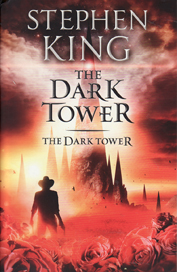

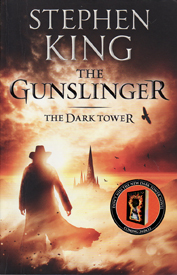
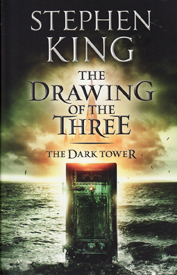
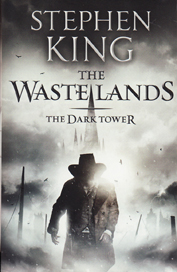
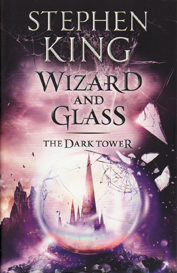
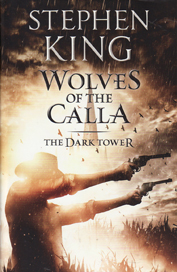
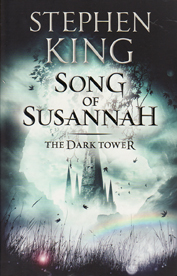
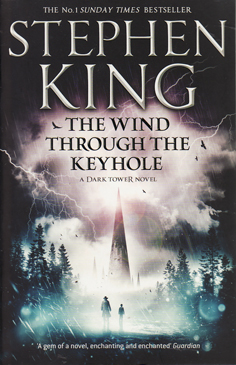


No one has commented yet. Be the first!